Is your glass half full or half empty? Depending on how 2021 is going for you, you’re either relishing the last half of the year or looking back on a slow six months.
Life can be quite a ride, I know it has been for me, and it’s something that I’ve been thinking about a lot recently. How is everyone? Now how are you reaaaally doing?
Life has its peaks and troughs, but have we come to accept that with a “that’s life…” sense of resignation?
Wheelspinnin’
About 2 months ago, I hit burnout. Sadly, it wasn’t the sort of burnout that saw me laying down donuts in the StrategiQ car park.
You can take as many breaks as you want, it’ll relieve the pressure but what do you learn about yourself going forwards? Luckily for me, a workshop with Charlotte Wiseman popped up from General Assembly.
I’m seeing a lot on social media about burnout at the moment, so what better time to bundle up my learnings from the workshop and present back to the StrategiQ team.

From Burnout to Balance
Billed as ‘Sustainable Leadership’, the aim of the workshop was to understand what burnout is, find balance, realise your strengths and promote positive health to the people around you.
In short, burnout is
- Emotional and physical exhaustion
- A sense of inefficiency & self doubt
- Cynicism of other people and things happening around you
(Bonus, it’s also a series of video games that have helped propel dangerous driving to the national sport we know today)
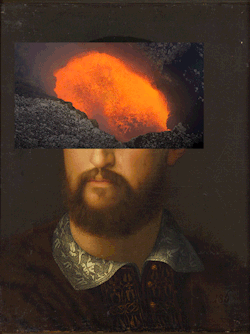
There’s absolutely no shame in being burned out, but we have to be honest about it. Not just to others but to ourselves too. 96% of leaders experience burnout in their careers, and 1 in 5 people are signed off with stress per year. Worse still, 90% of people admit to lying about why they are signed off as they worry about their employers reaction.
It doesn’t have to be this way. Yes, stress happens, but it’s how we cope and respond that matters. Workplaces should be positive places but it’s the way we work that sometimes hinders us. At StrategiQ we’re constantly encouraged to be honest about how we feel. By keeping dialogue open and working on our mindset, we help our relationships, satisfaction and performance.
Afterall, health enhancing activities are basically performance enhancing too.
Finding Strength and Balance
What does balance mean to you? It varies from person to person, and there was a really diverse range of meanings from our team when we discussed amongst ourselves. However you define balance, try asking yourself “How can I maintain balance to perform at my best and avoid the peaks and troughs?”
There can be a fine line between being at peak performance and falling into stress. We get stressed when the demands placed on us outweigh the resources we have to cope.
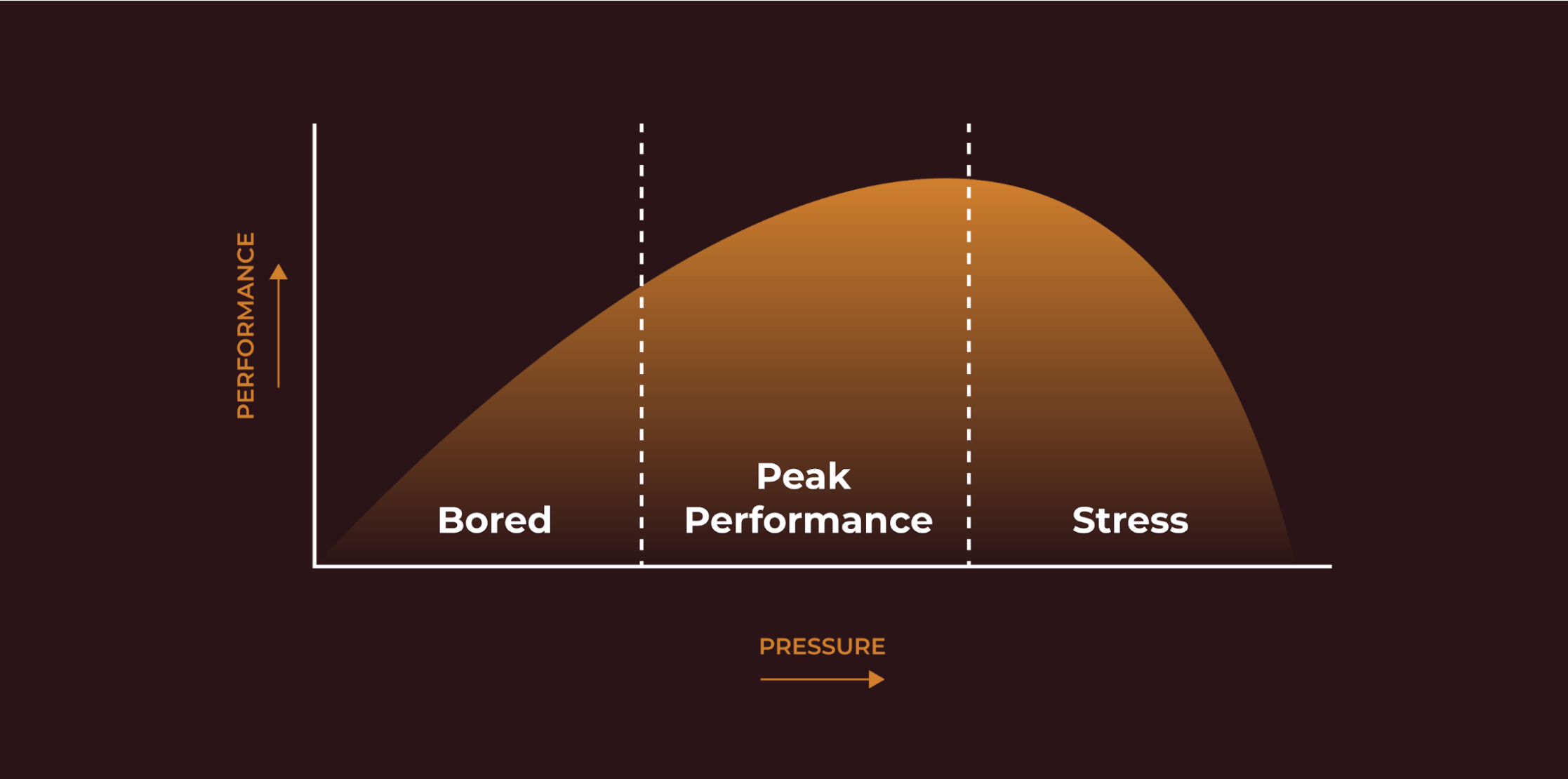
It isn’t just about the external though, we have to look after ourselves mentally and physically too. The first step of this is simple: Hydrate. Another helpful strategy is getting enough sleep. Less than 7 hours of sleep can make us 60% more reactive, so make sure you’re using sleep as the preparation for your next day! Apparently Roger Federer sleeps 12 hours a day, so if you’re a natural napper, you might be onto something.
Is your glass half full, half empty or overflowing?
This next bit is probably my favourite little strategy I learned.
The diagram below shows your ‘Container’ in the middle. Think of it as your life, basically. Pause and think about everything you’ve got going on at the moment, and put it in the container. I found it to be quite cleansing in a weird way, but I also noticed how much I’m carrying around with me.
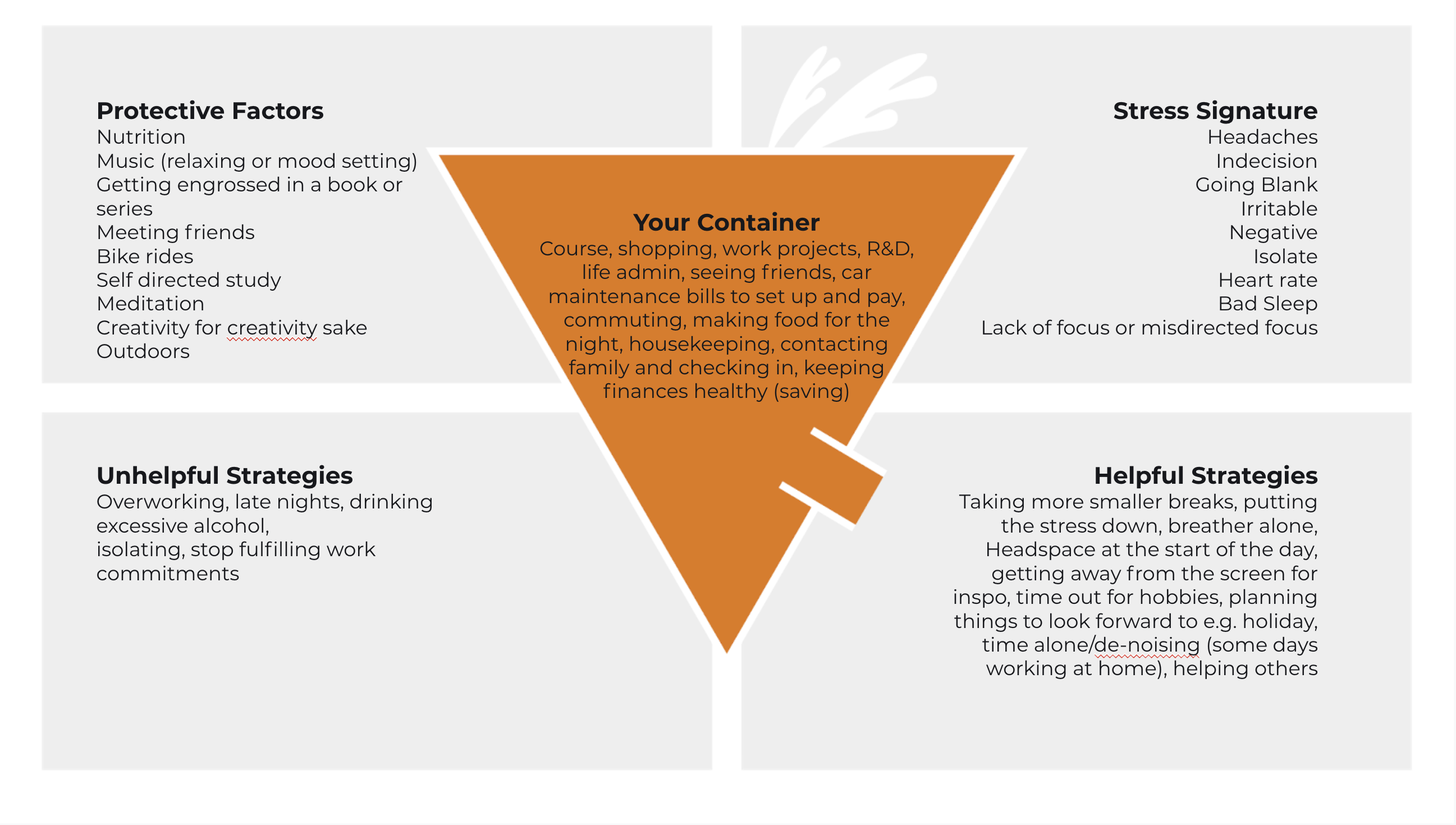
It’s worth noting that we don’t only get stressed by obviously stressful things. Bills, deadlines and commitments can all be sources of stress, however it’s when we add everything together that our lives become more than the sum of its parts. Maybe it was Dave’s loud eating at lunch time that pushed you over the edge, rather than that 4 o’clock client meeting.
How do you feel stress? There’s a lot of symptoms that had never occurred to me, so when you can identify the tell tale signs that affect you, note them down in the ‘Stress Signature’ box. These are the signs that our ‘container’ is overflowing.
To prevent that overflow, we need to open the imaginary tap and let things out into the Helpful Strategies box. What do you know makes you feel better and refocused?
Unhelpful Strategies are pretty self explanatory, the opposite of what makes us feel better. We need to be kinder to ourselves, more on that later.
Then back round to Protective Factors, these are almost the ‘fuel’ you add to a car, the essentials that keep us going. Over time, Helpful Strategies can become habits and routines that are more applicable in the Protective Factors area.
Thoughts about Thoughts
As I alluded to a second ago, we need to learn to be kinder to ourselves. I can’t be the only one to be my own harshest critic.

Ever found yourself circling around in your own head, feeding yourself a vicious circle of negative thinking that only makes you more stressed? You’ve probably fallen into one of these Cognitive Traps:
- Jumping to conclusions
- Disqualifying the positives
- Blaming yourself
- Magnification/Minimisation – Exaggerating negatives and belittling the good things that you’ve done.
- All or nothing thinking
- “Shoulds” and “Musts”
- Labelling – Seeing as people as just labels like “idiot” just for something they’ve done, forgetting the nuances of their character.
- ‘Alternate reality’ – “Things would have been so much better if this happened…”
- Decision paralysis – Uh oh, the feeling of being a rabbit caught in headlights, not sure which way to go except for nowhere fast…
Together these are Performance Inhibiting Thoughts (PITs) so if you find yourself falling into a PIT, there are some simple questions you can ask yourself (or someone else can ask to you):
- What evidence do I have? What else could be true?
- What can I control or influence, and what do I have to accept I can’t?
- When have I overcome similar and what did I learn?
- What would I say to a friend?
Taking a moment to stop and reflect with these is a great way to boil down your thought process into logical reasoning. That last one, “What would I say to a friend” is a great way to get away from the overly critical thoughts we feed ourselves, because we’d never talk to someone else in the same way we sometimes talk to ourselves.
On a side note, these questions can be posed to another member of your team, but make sure you let them think and solve their problems themselves. Don’t try to influence them, although it might sound harsh, we all need to develop the strategies to deal with our problems, learn and move on.
Building Strengths
Part of finding balance in our lives is in recognising our strengths and playing to them.
Strengths are qualities of character that make us who we are. They can be developed, and the skills we learn are built on our strengths (which in turn are influenced by our personal values).
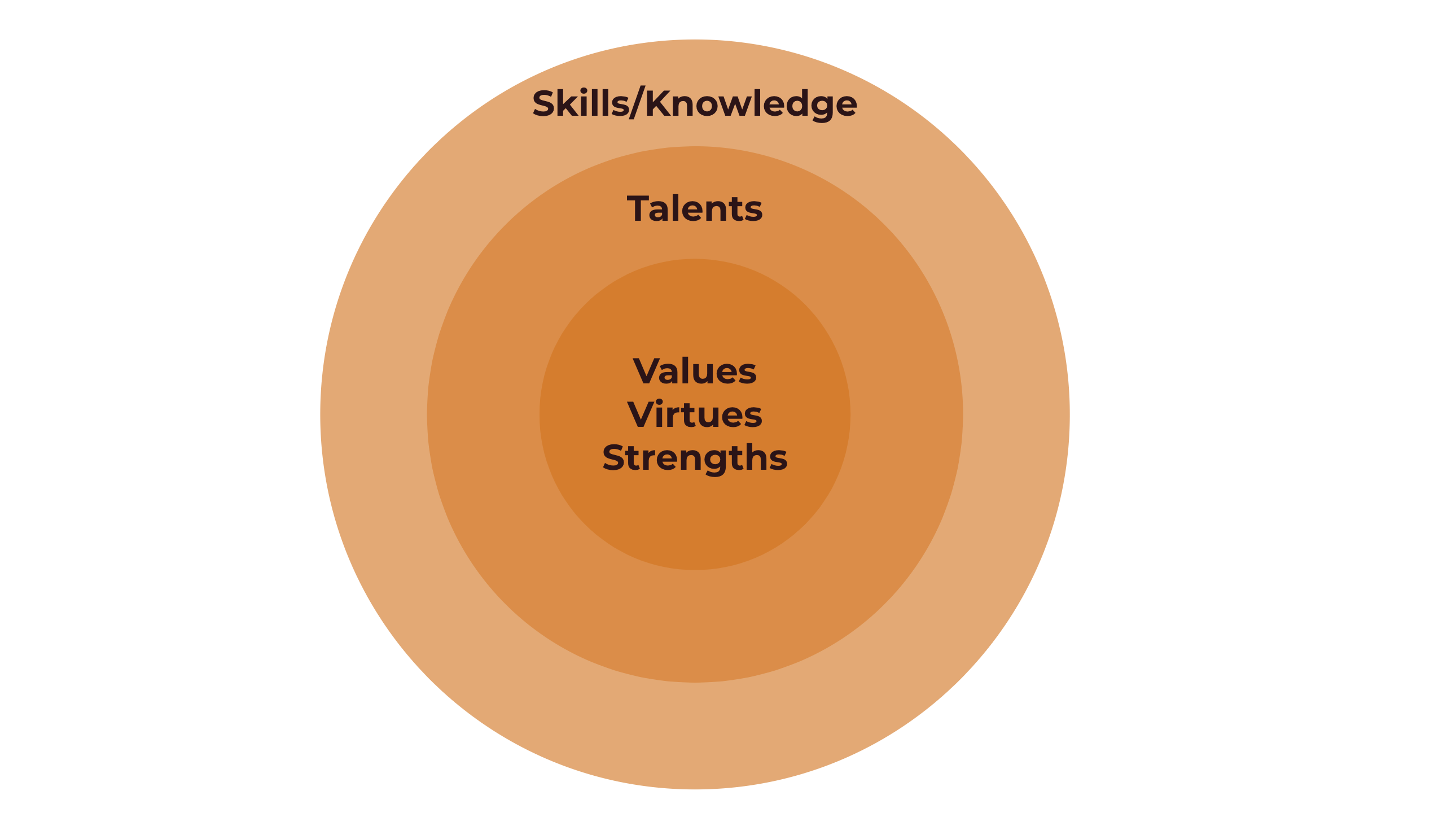
By drawing on our own strengths to help the people around us, we’ll all be at our best.
See the Strengths Wheel below. We all have these strengths, just some are less developed than others. Which ones would you say are a strength of yours? Are there some that you want to improve and develop?
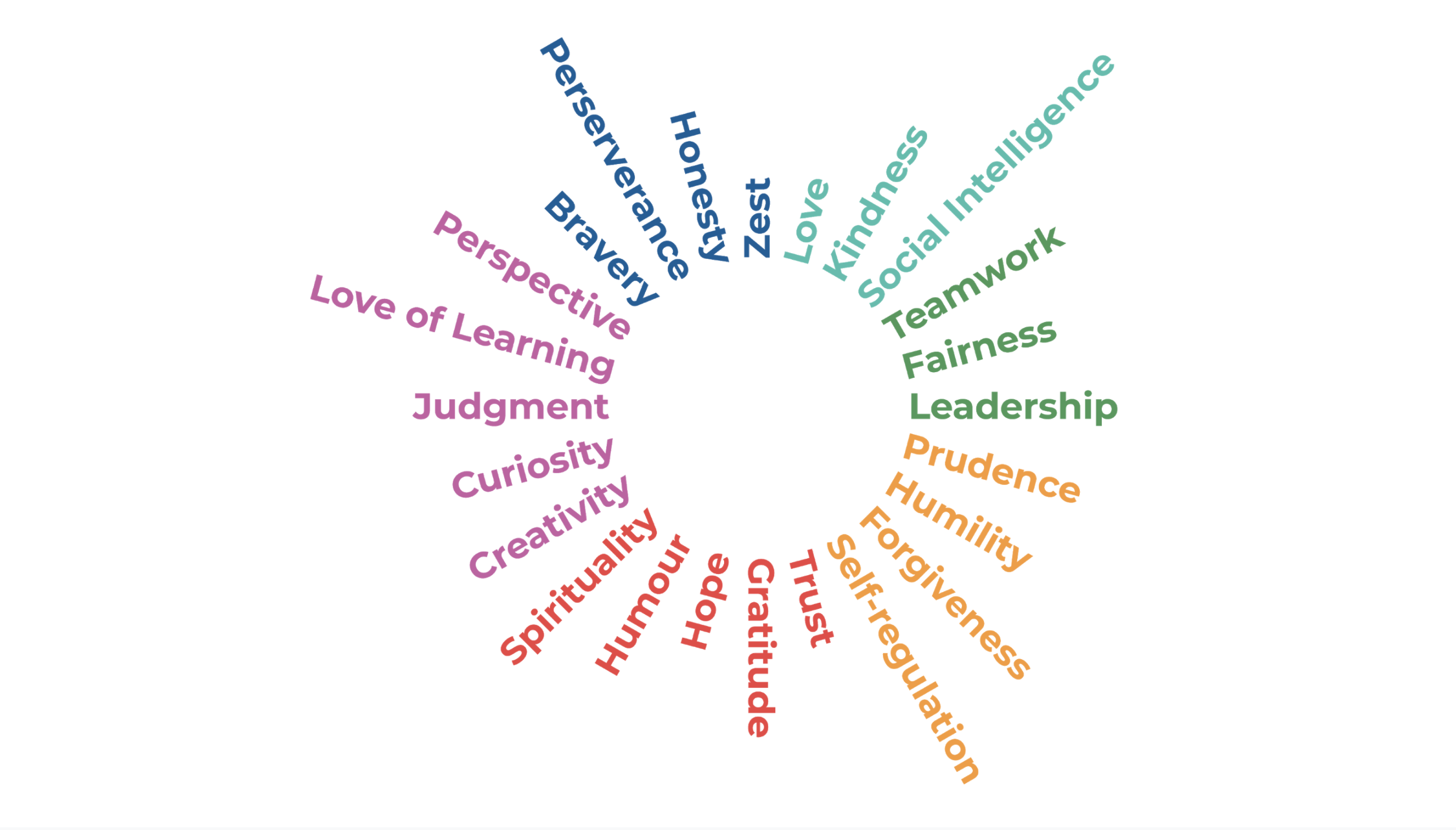
Think of a time when you were at peak performance, chances are you were utilising some of your key strengths. Really take a moment to reflect on that time. Felt good, right?
Using our strengths improves our health, relationships and resilience, and can boost performance by up to 18x.
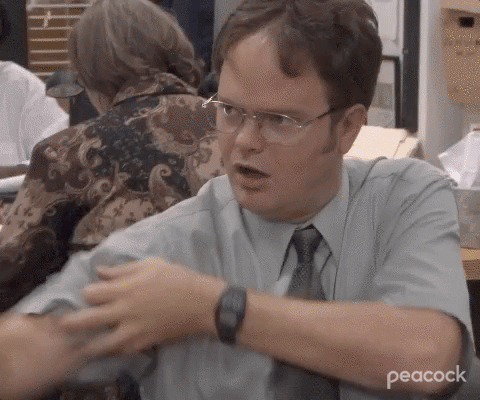
Don’t feel that other areas of the Strengths Wheel are weaknesses, strengths can be developed like muscles. One cliche that frustrates me is when people say they’re not creative. It’s human nature to be creative! By working on that strength, you can develop it.
Stronger Together
It’s not just about recognising our own strengths though, but those of the people around us.
Not everyone know their strengths, but there’s a simple way to help them realise what they’re good at.
Communicate it! Pick out something they did well and how they demonstrated their strengths. Obviously don’t shoehorn it into every sentence, but something along the lines of “I’d really like you to do this because of your creativity” if you’re asking a favour, or “Thank you for doing that, I really appreciate your perseverance”, if you’re thanking someone for putting in a shift to help you.
Over and Under
Strengths are incredible, however it is possible to overuse them. Maybe you’re the office clown, but has your humour ever got you into trouble? Or perhaps you’ve got awesome leadership skills, but you really struggle to let go of things that other people are actually better at than you.
Be more reflective of your actions, with more awareness of the strengths you’re using and whether or not you use some too much, or in the wrong way. It won’t just help you, it’ll help the people around you too.
What about those underdeveloped strengths from earlier? Well, how about identifying one that you’re underusing and want to grow. For the next 2 weeks, on each day jot down how you’re going to use that strength and develop it.
It’s like working out, it’s only beneficial if you form a healthy habit out of it. While you’re doing that, you’re creating new thought patterns in your brain, creating new neurons. It takes around 90 days from a neuron being born to being fully developed, so stick at it!
Promoting Positive Health
As mentioned earlier, We talk to ourselves in a way that we’d never talk to another person. We need to be our own best friend and supporter, not our harshest critic.
Failures aren’t something to beat ourselves up over, we need to celebrate them as well as our successes. We learn more from our mistakes than things that went well. If you don’t already, share your fail of the week with your team, along with some good news and wins. Last week’s failure could turn into this week’s win.
Open up to feedback too, and make sure to ask for it.
What will you do differently to prevent burnout? How will some of these learnings and strategies impact you, your team and the business?


















